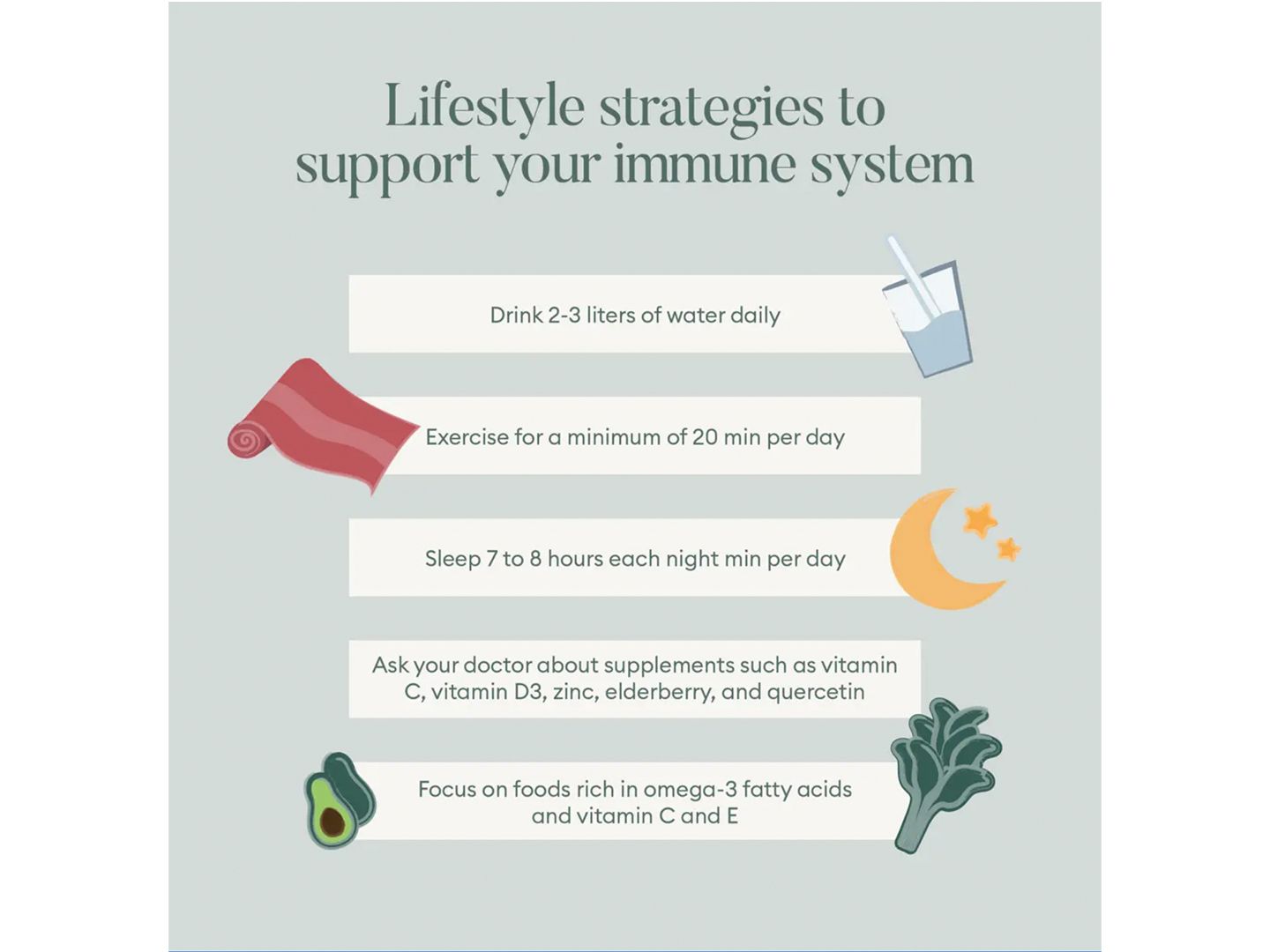By now you’ve heard of "immunocompromised" individuals, or people with conditions like diabetes, cancer, or certain genetic disorders that make it tough for their bodies to fight off infection. But just because you don’t have a diagnosable immuno-suppressing condition doesn’t necessarily mean that your immune system is in fighting shape.
If you come down with lots of colds or other infections, often feel fatigued (even after a solid eight hours of shuteye), or experience a handful of other symptoms, it could be a sign of a weak immune system. Here’s what you need to know about the factors that can take a toll on your immune function—and what you can do to bolster your body’s germ-fighting system for the long haul.
How does your immune system work?
Your immune system’s main job is to protect your body against outside invaders—like viruses, bacteria, or other pathogens—and keep you healthy. “You can think of it as a defending army made up of organs, proteins, and cells that all work together to fight infection and other diseases,” says Gabriella Safdieh, MD, a pediatrician and rheumatologist formerly at Parsley Health.
Your immune system does this by recognizing and mobilizing against antigens, which are the parts of foreign bacteria, viruses, or other invading substances that trigger an immune response.
There are two major parts to your body’s immune defense system. The first, which all babies are born with, is called innate immunity, and it’s essentially a blanket attack against any type of foreign invader.
The second part is called adaptive immunity. This is a learned defense that is acquired over your lifetime. As you encounter different antigens, your immune system can remember them and fight them more effectively the next time you’re exposed. (Adaptive immunity is why we only get some illnesses, like chickenpox, once.)
What causes a weak immune system?
Because your immune system is so complex, and requires a number of different components working together, sometimes things can go haywire. Both innate and adaptive immunity utilize white blood cells, which are like your body’s security guards, constantly patrolling and looking for signs of problems. There are several types of white blood cells, but they all help your body fight off infection. When they aren’t functioning properly, it can leave you susceptible to illness.
If your white blood cells overreact to antigens, for example, it can cause dangerous levels of simmering inflammation inside your body and lead to chronic conditions like allergies. Sometimes the immune system can even attack your own healthy cells, causing a type of illness known as autoimmune disease. (There are more than 100 types of autoimmune diseases, including Type 1 diabetes, rheumatoid arthritis, multiple sclerosis, and Crohn’s disease.)
In other cases, you may have a weak immune system due to an immunodeficiency disorder, or simply as a result of growing older. (Your body’s production of white blood cells wanes as you age.) Your lifestyle can also affect how well your immune system is working, adds Dr. Safdieh.
“Poor nutrition can weaken your immune system,” she says. “Food is medicine, and the vitamins and nutrients that we put into our body play a huge role in keeping our immune system strong.”
One reason is that a major portion of your immune system—70 percent, according to Dr. Safdieh—actually lies in your gut. The microbiome, a mix of helpful bacteria inside your gut, helps to regulate your immune function, preventing it from overreacting or underreacting to antigens.
“If we’re not creating a healthy microbiome, then the immune system is at risk,” says Dr. Safdieh.
Eating lots of processed foods can increase the amount of harmful bacteria in the gut and decrease the amount of helpful bacteria, leading to a state called dysbiosis. “That increases permeability of the gut lining, which allows toxins to leak out of the gut and into our bloodstream, and that leads to an overall state of immune dysfunction,” Dr. Safdieh explains.
Anxiety and stress, which are so overwhelming for many people right now, can also erode immune function in a number of ways.
“Stress can lead to poor nutrition choices. It decreases the body’s production of lymphocytes, which are a type of white blood cell,” says Dr. Safdieh. “Stress also leads to hormonal imbalances that impact sleep quality. Even if you manage to get a full night’s sleep, the quality of your sleep is harmed. And high quality sleep time is when your immune system builds up its strength. It’s like knocking over dominoes.”
5 signs of a weak immune system
So how do you know just how strong your immune defenses are? Look out for these indicators of a weak immune system.
You seem to catch every bug going around (and it takes you forever to recover).
“If you get lots of colds or you need to take antibiotics multiple times a year, it could be a sign that there’s something wrong with your body’s defenses,” says Dr. Safdieh. “The duration that it takes to fight off infection is also linked to the state of your immune system.”
You often experience digestive issues.
Frequent belly pain, bloating, or food sensitivities can be signs of dysbiosis and poor immune function, according to Safdieh.
You get weird breakouts or rashes.
“Your skin is a barrier that provides a first line of defense against germs, and it’s a major component of your immune system,” says Dr. Safdieh. Unexplained acne, patches of eczema, or other rashes are a symptom of inflammation and can occur when the immune system isn’t functioning correctly.
You can’t seem to lose weight no matter what you do.
While there can be other reasons for unexplained weight gain, according to Dr. Safdieh it’s sometimes associated with chronic stress, inflammation, and poor immune function. “It could even be a sign of the beginnings of an autoimmune disease,” she says.
You wake up feeling tired and have frequent bouts of brain fog.
“If you feel foggy and exhausted despite getting eight hours of sleep, you could have an underlying immune dysfunction,” says Dr. Safdieh.
7 ways to support your immune system
If you have a weak immune system or just want to support your immune system, there are steps you can take. Working with a holistic doctor and health coach, like those at Parsley Health, can also help you implement immune supportive strategies that work for you.

Eat a healthy diet.
“Processed foods, preservatives, refined sugar, gluten, and dairy are taxing on the immune system and increase inflammation,” says Dr. Safdieh. “You should really try to rid your diet of those foods as much as you can, and incorporate lots of high-quality protein, healthy fats, and fruits and vegetables.”
She also recommends fermented foods, like kimchi, yogurt, or sauerkraut, which can support the immune system by increasing helpful bacteria within the microbiome.
Season your food with anti-inflammatory herbs.
Fresh parsley, cilantro, garlic, ginger, and curcumin (found in turmeric) are known to reduce inflammation in your body, says Dr. Safdieh, helping you fight infection more effectively.
Get plenty of sleep.
Research shows that sleep is vital for the development of your body’s adaptive immune system. Chronic insomnia or poor sleep can increase stress hormones, promote inflammation, and make you more susceptible to infections.
Hit the gym (or the pavement, or the pool…)
Exercise can help improve your sleep and fight stress, which are both important for immune function. In fact, research has shown that people who are active get fewer colds than those who don’t exercise. Staying in shape is also important in and of itself.
“Increasing abdominal fat releases cytokines, a protein that signals the immune system into action,” says Dr. Safdieh. “While you need cytokines to help fight infection, in large numbers they have a negative impact on the immune system, triggering dangerous amounts of inflammation.”
Choose your booze wisely.
Drinking in moderation (no more than one drink a day for women, or two for men) is a good idea, says Dr. Safdieh, “and try to give your body a break from alcohol at least a few days a week.” Alcohol can have a negative impact on your gut’s microbiome and impair immune cells. And we all know that alcohol can weaken your resolve to choose healthy foods over, say, Cheez-Its.
If you drink in the evening, Dr. Safdieh also suggests stocking the liquor cabinet with clear alcohol (like vodka), which is better metabolized by your body compared to high-sugar drinks like wine. “The longer it takes for your body to metabolize the drink, the more likely you are to experience sleep disruptions,” she says.
Quit smoking.
Every major system and organ in your body is harmed by smoking, and that includes your immune system. “Quitting decreases inflammation and also improves your overall health, making it easier for your body to fight off those invaders,” says Dr. Safdieh.
Reduce or manage your stress.
Self-care is vital for your mental well-being as well as for supporting a weak immune system. “Stress is a normal part of life, and these days especially, it’s impossible to eliminate it,” says Dr. Safdieh. “But stress also revs up production of hormones that suppress the immune system and keep it from functioning properly.” That’s why it’s important to find something that relaxes you, whether it’s deep breathing, mindfulness meditation, exercise, or just watching a favorite funny TV show.







